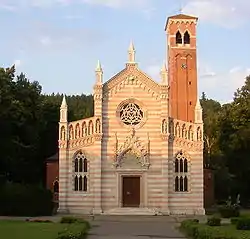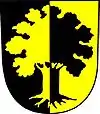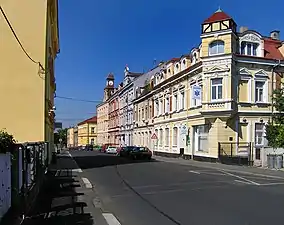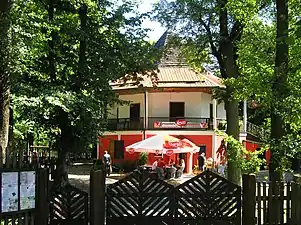Dubí
Dubí (Czech pronunciation: [ˈdubiː]; German: Eichwald) is a town in Teplice District in the Ústí nad Labem Region, of the Czech Republic. It has about 7,900 inhabitants. It lies in the Ore Mountains.
Dubí | |
|---|---|
Town | |
 Church of Immaculate Conception | |
 Flag  Coat of arms | |
| Etymology: Place of oaks / oak forest | |
 Dubí Location in the Czech Republic | |
| Coordinates: 50°40′44″N 13°47′27″E | |
| Country | |
| Region | Ústí nad Labem |
| District | Teplice |
| First mentioned | 1494 |
| Government | |
| • Mayor | Petr Pípal |
| Area | |
| • Total | 33.85 km2 (13.07 sq mi) |
| Elevation | 389 m (1,276 ft) |
| Population (2020-01-01[1]) | |
| • Total | 7,876 |
| • Density | 230/km2 (600/sq mi) |
| Time zone | UTC+1 (CET) |
| • Summer (DST) | UTC+2 (CEST) |
| Postal code | 415 01, 417 01 – 417 03 |
| Website | www |
History
Dubí was first mentioned in the period of 1494–1498 as a village of tin miners (in Czech cín, giving the name to nearby village of Cínovec located on the border with Germany).
Rapid development started in the 19th century. First, a new road to Saxony was built, followed by a spa (1862) and in (1864) A. Tschinkel purchased a mill Buschmühle where he established porcelain factory that in 1871 changed name to "Eichwalder Porzellan und Ofenfabriken Bloch and Co." Furthermore, a new railroad (1884) made Dubí a popular holiday spa resort, visited by Johann Wolfgang Goethe, Jan Neruda, Václav Talich and others.
Economy
Europe's largest deposits of lithium-bearing mica zinnwaldite in Cínovec, a village which gave its old German name Zinnwald (German for Tin Wood) to the mineral, were expected to be mined starting 2019 (as of June 2017).[2][3] As of April 2019, it is expected to start in 2022.[4]
Transport
Dubí is an important transit point to Germany on European route E55, and the border crossing Cínovec is located within the town limits. There is a spa with mineral waters and a china factory there. The scenic railroad line (Most–Dubí–Moldava) that passes through the town, was declared a national monument in 1998.
Sights and spa
The most important sight in Dubí is Saint Maria's Church, which was built on the order of princes Clary-Aldringen between 1898 and 1906 as a copy of the Venice church Santa Maria dell'Orto to serve as their family's church.
The first spas in Dubí were built in 1860 under the management of Anton Tschinkel, the founder of a local china factory. In 1862, his first spa (Diana Spa) was opened. The present-day Theresa Spa with mineral waters, recommended to patients after brain and spine surgeries, have been operating since 1879.
Publicity
After the Velvet Revolution, the town received bad publicity due to rampant prostitution, fueled by the close proximity to Germany, location on a main truck route and low purchasing power in the Czech Republic; municipal authorities have been struggling with this issue with some recent successes.[5][6]
Gallery
 Local part Pozorka
Local part Pozorka Dvojhradí castle
Dvojhradí castle
References
- "Population of Municipalities – 1 January 2020". Czech Statistical Office. 2020-04-30.
- http://www.spiegel.de/international/germany/lithium-exploration-underway-at-german-czech-border-a-830889.html
- https://www.reuters.com/article/czech-lithium-idUSL8N1J44UL
- https://www.e15.cz/byznys/prumysl-a-energetika/australane-se-priblizili-tezbe-lithia-na-cinovci-1357741
- Dan Bilefsky, Financial Crisis Tames Demand for World's Oldest Service, New York Times, December 8, 2008.
- Stastna, Kazi. "Taxing the Professionals". Central Europe Review. Retrieved 2009-10-17.
External links
| Wikimedia Commons has media related to Dubí. |
- Official website (Czech)
- Railroad Dubí - Moldava and its timetable (Czech)
- Theresa's Spa in Dubí (English)